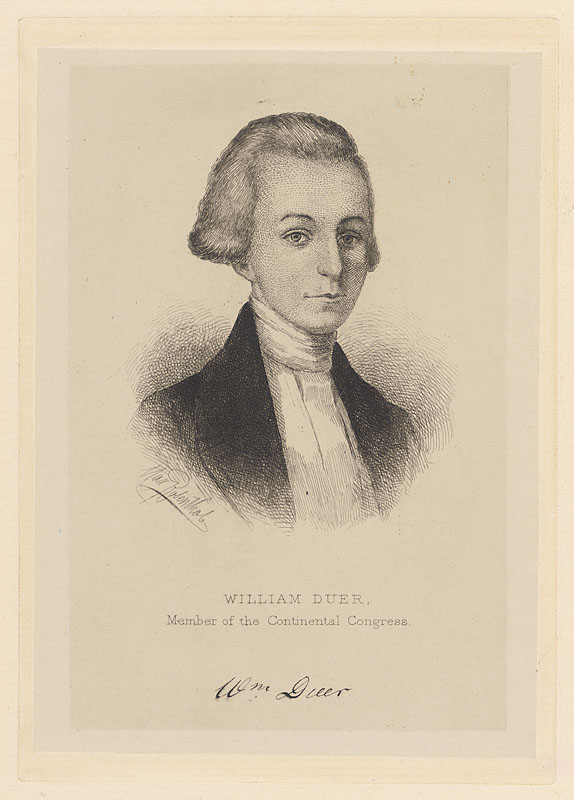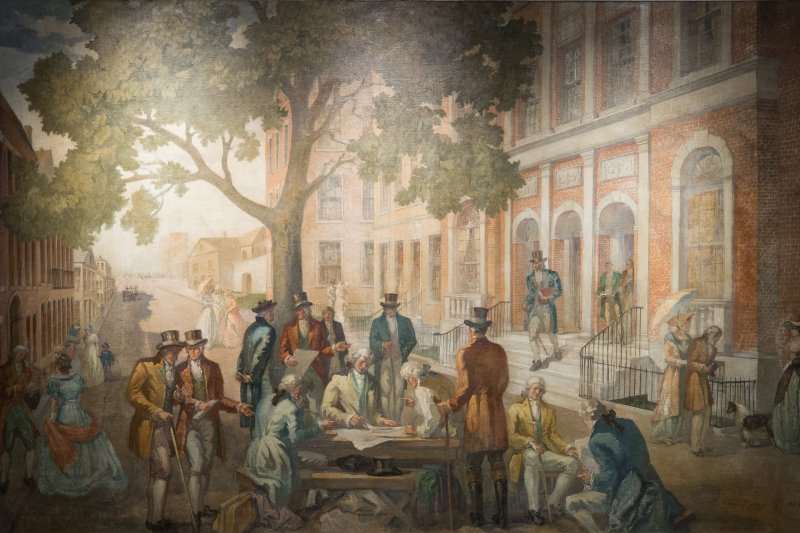Related Posts
- Buy Tickets for The Constitutional Walking Tour of Philadelphia – See 20+ Sites on a Primary Overview of Independence Park, including the Liberty Bell and Independence Hall
- Independence Hall
- Second Continental Congress
- America's Founding Fathers
- First Bank of The United States
- Alexander Hamilton - One of America's Founding Fathers
Birth: March 18, 1743
Death: May 7, 1799 (age 56)
Colony: New York
Occupation: Plantation Owner, Merchant, Politician
Significance: Signed The Articles of Confederation (at the age of 35); served as a Delegate to the Continental Congress(1778-1779); served as Assistant Secretary of the Treasury under Alexander Hamilton (1789-1792)

William Duer was one of the Founding Fathers of the United States. Born in England to a wealthy family which owned a series of large plantations in the West Indies, Duer spent his childhood traveling between England and the West Indies with his family.
Duer was primarily educated in England. After the death of his father, Duer became the proprietor of his family's vast plantation holdings and hundreds of slaves. Management of the plantations brought Duer to New York City where he sought to establish a contract for regular lumber shipments to his plantations. While in New York City, Duer befriended Philip Schuyler, the future father in law of Alexander Hamilton. With the assistance of Schuyler, Duer secured lumber for his plantations and started a successful mercantile company. Schuyler also convinced Duer to establish his primary residence in New York.
While in New York, Duer became involved in politics, and he was named a member to the 1775 Provincial Congress of New York and served on the committee that drafted the first New York Constitution. In 1778, Duer traveled to Philadelphia in order to serve in the Second Continental Congress. Duer was among the first signers of the Articles of Confederation on July 9, 1778 after the Articles were ratified by his Colony of New York.
Duer remained in the Continental Congress after signing the Articles of Confederation until 1779. Duer then returned to New York City where he continued managing his plantations from afar and building his business interests. Duer ended up befriending Alexander Hamilton through Philip Schuyler and when Hamilton was named Secretary of the Treasury, Duer obtained the position of Assistant Secretary of the Treasury.
Unfortunately, Duer used his political connections and position in an attempt to enrich himself. Duer engaged in a scheme to sell land he did not own in the Northwest Territory while also attempting to buy large amounts of American debt from the French. Duer also used his position to borrow huge sums of money to drive up a bidding war on American bonds that were sold after the establishment of The First Bank of the United States. In 1792, irregularities were discovered in the Treasury Department and in an unprecedented case in American History, the Federal government sued Duer.
Duer's arrest and the collapse of his financial schemes led to the Panic of 1792, the first major financial crisis in American history. Duer's schemes bankrupted many, and Duer became a vilified figure. Some of Duer's spurned investors even went to visit Duer in jail in an attempt to recoup their investments at gunpoint. Duer required round the clock protection while in jail when angry mobs surrounded his cell demanding retribution. Alexander Hamilton had to move quickly to try to stabilize the financial markets, and he was able to prevent a total collapse of the American financial system.

Following Duer's arrest, efforts began to create regulations for New York's previously unregulated and informal financial markets, in order to prevent a repeat of the chaos Duer caused. In May of 1792, 24 brokers met at 68 Wall Street in New York City and reached an agreement to formalize their securities market. This important document came to be known as the Buttonwood Agreement since it was said to have been signed under a Buttonwood tree. Twenty-five years later in 1817, the regulated market created in response to Duer's crimes became the New York Stock Exchange.
Duer spent the rest of his life in New Gaol Debtors' Prison, which was located in Manhattan and was described as a "dismal cage" and a "human slaughterhouse." Duer died penniless in the New Gaol Debtors' Prison seven years after his arrest in 1799.
William Duer in Philadelphia
William Duer first came to Philadelphia in 1778 to serve as a Delegate to the Second Continental Congress. While serving as a member of the Second Continental Congress, Duer worked at Independence Hall, where he signed The Articles of Confederation. Duer returned to Philadelphia in 1790, while he served as Assistant Secretary of the Treasury under Alexander Hamilton. While serving in this position, Duer helped establish The First Bank of the United States before he was imprisoned due to his financial improprieties and inability to pay his debts.
Today, Independence Hall and the First Bank of the United States are both stops visited along The Constitutional Walking Tour!



